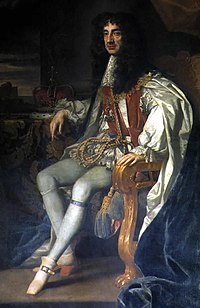Charles II of England
British monarch from 1660 to 1685
Charles II (1630–1685) was king of England from 1660 until his death. His father, Charles I, had been executed, and England was mainly ruled by Oliver Cromwell. Two years after Cromwell died, Charles was made king. His reign saw the Restoration period. Charles died in 1685, leaving the crown to his Roman Catholic brother James II.

Quotes
- "Better than a play."[1]
- Speaking on the debates in the House of Lords about Lord Ross's Divorce Bill in 1670.
- "He [Charles II] said once to myself, he was no atheist, but he could not think God would make a man miserable only for taking a little pleasure out of the way."[2]
- Simple: He once said to me, he was not an atheist, but he could not think God would make a man unhappy for taking a little fun out of the way.
- "He [the Earl of Lauderdale] told me, the king spoke to him to let that Presbytery go, for it was not a religion for gentlemen."
- Simple: He told me that the king had told him to leave the Presbytery, because it was not a religion for a gentleman.
- "His nonsense suits their nonsense."[1]
- Simple: His rubbish suits their rubbish.
- "I am sure no man in England will take away my life to make you King."[1]
- Spoken to his Roman Catholic brother James.
- Simple: I am sure that no man in England will kill me to make you king.
- What it means: England was mostly against the Roman Catholic religion at this time. James was unpopular for converting to that religion.
- "I am weary of travelling and am resolved to go abroad no more. But when I am dead and gone I know not what my brother will do: I am much afraid that when he comes to wear the crown he will be obliged to travel again."[1]
- Speaking of the differences between himself and his brother James.
- Simple: I am tired of travelling and I have decided not to leave the country again. But when I am dead, I do not know what my brother will do: I am afraid that, when he becomes king, he will be forced to travel again.
- "This is very true: for my words are my own, and my actions are my ministers'."[1]
- Speaking as a reply to John Wilmot, 2nd Earl of Rochester's epitaph.
- Simple: This is very true: my words are mine, and my doings are my ministers'.
- "He had been, he said, an unconscionable time dying; but he hoped that they would excuse it."[1]
- Simple: He had been having a difficult time dying; but he hoped they would not mind him.
References
- ↑ 1.0 1.1 1.2 1.3 1.4 1.5 "Charles II". A. Bryant, King Charles II (1931). Oxford Dictionary of Quotations (2004). Retrieved on November 16
- ↑ Burnet, Gilbert (1850). Bishop Burnet's History of His Own Time: From the Restoration of King Charles the Second, to the Treaty of Peace at Utrecht, during the Reign of Queen Anne. London: William S. Orr & Co., 61.
Other websites
- Charles II of England on Wikipedia
- Charles II of England on Wikimedia Commons
- Works by Charles II of England on the English Wikisource